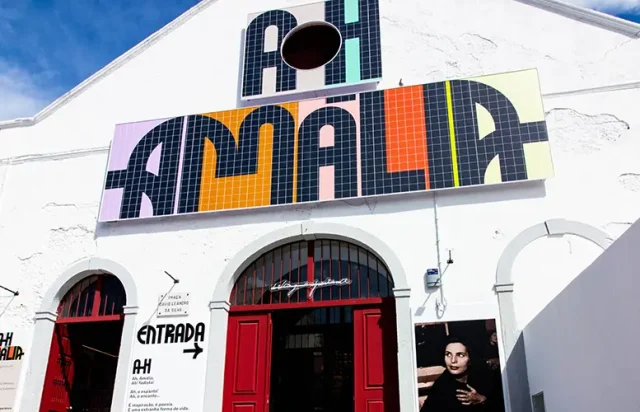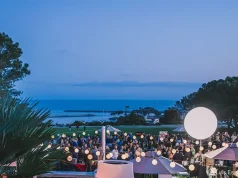
It’s often hard to define the music best associated to a country but Portugal’s sound is Fado. Amália Rodrigues is the Queen of Fado. Since 2011, Fado has been classified by UNESCO as ‘World Heritage’ (Intangible Cultural Heritage of Humanity).
She has inspired everyone from Frank Sinatra to Madonna and now a new permanent immersive exhibition in a dedicated space has opened in Portugal’s capital city Lisbon, celebrating the life of the Queen of Fado. Ah Amália – Living Experience invites visitors to embark on a journey of discovery learning all about this celebrated Portuguese icon who performed globally throughout the 20th Century between the 1940s and 1990s.
Anyone visiting Lisbon will likely come into contact with Amália’s magical voice, either by hearing Fado music across the city, or passing one of many locations where Amália lived or performed, or which were later dedicated to her memory. These include a design by leading Portuguese artist Vhils entitled “Calçada” which features Amália’s face created using traditional Portuguese stone flooring which can be seen on Rua São Tomé in Alfama. Amália’s home and garden are now a museum in São Bento, Lisbon and one of the city’s most prominent parks Parque Eduardo VII dedicated a garden to Amália.
Amália Rodrigues (1920-1999), known simply as Amália, travelled the world over decades, performing in 68 countries in iconic venues including Carnegie Hall, the Lincoln Center, the Hollywood Bowl and l’Olympia in Paris. She sang Fado mainly in Portuguese but also in Spanish, Italian, French and English. For decades her home country was essentially cut off from the world living under the brutal Salazar dictatorship but somehow Amália was free to be the unofficial Portuguese ambassador around the globe, often moving audiences to tears with her haunting voice singing in a language new to many. Back home Amália was balancing her image between the traditional and the modern, something which the dictatorship kept a close eye on.
Amália released 150 records which resonated with her fans as she sang from the heart with lyrics about the struggles of daily life, heartbreak and loss. She recorded in leading studios around the world including in London at the Abbey Road studio, in France, Italy and Brazil and elsewhere.
Amália was also an actress in several Portuguese films. She met Frank Sinatra, Ava Gardner, Juliette Gréco and Ernest Hemingway. But she will always be remembered for her voice, and performances on stage. And for her huge personal style.
Liberal and open-minded, she was regarded as a gay icon. Her personal life could be volatile, with several very public broken relationships and a health scare that led to a suicide attempt in a New York hotel in 1984, but she survived and lived to the age of 79.
In 1999, the world said goodbye to Amália with three days of national mourning in Portugal where she was given a state funeral (she performed on stage well into her 70s). But she lives on today as the soul and sound of Portugal. Her tomb is in Portugal’s Pantheon where Amália was the first woman ever to be laid among the greatest Portuguese figures. By the time of her death, Amália had received more than 40 honours including those from Portugal, Spain and Japan and most notably from France where she was awarded the Légion d’Honneur by President Mitterrand in 1991.
Ah Amália – Living Experience is a new permanent exhibition in Lisbon and the only immersive biographical story dedicated to this Portuguese icon. Visitors are invited to discover the world of Amália through the latest generation of virtual reality, holograms and interactive installations. Through eight rooms, visitors can explore the artist’s legacy with period set designs and interactive content that merges the physical with the digital, including virtual reality, 360º video-mapping, lifelike holograms and even Amália performing at one of the world’s most iconic stages: l’Olympia in Paris.
A full-scale hologram transports visitors to this legendary venue. This stage became a second home for Amália, where she recorded multiple live albums and captivated audiences with her powerful voice and presence. Watch in awe as the life-like hologram replicates her unforgettable performances, bringing the essence of Amália to life in an extraordinary and immersive way.
Fado remains vibrant in Portugal with many newer artists adapting this musical genre to their own style and selling globally, including Mariza, Carminho, Ana Moura and Gisela João among many others. All have performed in the UK several times and appeared on Later… with Jools Holland on the BBC.
This is not just a tribute, but a chance to witness history and feel the passion of Amália and Fado and the events of the recent past.
Amália lives on, and Ah Amália – Living Experience welcomes old and new fans who want to cherish and celebrate Portugal’s soul.





